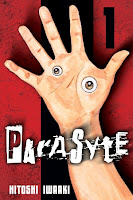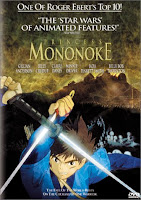My News and Reviews
I stayed home sick from work for two days this past week. I ended up sleeping for most of the time, but I also got some manga reading in and finished watching Moribito when I could sit up again. I was also able to get a couple reviews written. One, Tourism in Japan: An Ethno-Semiotic Analysis, was written as part of the 2010 Green Books Campaign. I had the chance to participate in this event last year, too. The second review (and my first in-depth manga review for November) was for Yumiko Shirai’s Tenken, which won the 2007 Japan Media Arts Award Encouragement Prize—it’s a gorgeous manga if nothing else.
I also made a few updates to the Resources page. Two publisher pages have been added: Manga University and DrMaster. In the “News and Reviews” section I’ve included MangaCast, run by Ed Chavez and Khursten Santos; Manga Views, which includes a nice aggregator feed among other things; Manga Report, the manga specific site of fellow librarian Anna from TangognaT (who also runs Manga Views); and Slightly Biased Manga which has a lot of great manga reviews.
Quick Takes
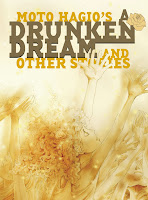 A Drunken Dream and Other Stories by Moto Hagio. I wasn’t originally going to pick up this collection, but then a lot of people whose opinions I respect started raving about it. I’m very glad I bought a copy. There’s a lot of depth to these short stories, sometimes more than what first appears. It’s a great selection spanning Hagio’s entire career so far. I’ve not previously read any of Hagio’s works, but after reading this collection and the included interview I really want to. Not much is available in English by this influential mangaka yet, but I hope that changes. I’m particularly interested in reading her science fiction and boys’ love pieces.
A Drunken Dream and Other Stories by Moto Hagio. I wasn’t originally going to pick up this collection, but then a lot of people whose opinions I respect started raving about it. I’m very glad I bought a copy. There’s a lot of depth to these short stories, sometimes more than what first appears. It’s a great selection spanning Hagio’s entire career so far. I’ve not previously read any of Hagio’s works, but after reading this collection and the included interview I really want to. Not much is available in English by this influential mangaka yet, but I hope that changes. I’m particularly interested in reading her science fiction and boys’ love pieces.
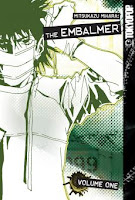 The Embalmer, Volumes 1-2 by Mitsukazu Mihara. I came across this manga mostly by accident, but I’m glad I gave it a shot. The second volume is even better than the first, so I’d definitely like to read the rest of the series as well. Shinjyurou is an enigmatic and charismatic character and I want to know more about him. At first he seems only to be a good looking playboy, but it’s soon apparent he’s deeper and more complex than that. He faces a fair amount of discrimination as an embalmer in Japan but believes in his chosen profession and the peace it can bring to the living. So far, the manga seems to be fairly episodic although there’s an underlying story and romance.
The Embalmer, Volumes 1-2 by Mitsukazu Mihara. I came across this manga mostly by accident, but I’m glad I gave it a shot. The second volume is even better than the first, so I’d definitely like to read the rest of the series as well. Shinjyurou is an enigmatic and charismatic character and I want to know more about him. At first he seems only to be a good looking playboy, but it’s soon apparent he’s deeper and more complex than that. He faces a fair amount of discrimination as an embalmer in Japan but believes in his chosen profession and the peace it can bring to the living. So far, the manga seems to be fairly episodic although there’s an underlying story and romance.
 GTO: Great Teacher Onizuka, Volumes 21-25 by Tohru Fujisawa. It’s outrageous, over the top, and completely unbelievable, but I do love this series and was very happy when I was able to find the last few volumes. By this point some of the plot elements seem a bit repetitive, some purposefully so, but Fujisawa never fails to surprise me. He also found a way to end the series that works and I’m not sure that it could have been sustained for much longer. Onizuka is a great character, granted a bit of a lecherous bastard, but he’s honest with himself and others and forces others to be honest with themselves. He gets into all sorts of trouble in the process, but always manages to pull through for his students.
GTO: Great Teacher Onizuka, Volumes 21-25 by Tohru Fujisawa. It’s outrageous, over the top, and completely unbelievable, but I do love this series and was very happy when I was able to find the last few volumes. By this point some of the plot elements seem a bit repetitive, some purposefully so, but Fujisawa never fails to surprise me. He also found a way to end the series that works and I’m not sure that it could have been sustained for much longer. Onizuka is a great character, granted a bit of a lecherous bastard, but he’s honest with himself and others and forces others to be honest with themselves. He gets into all sorts of trouble in the process, but always manages to pull through for his students.
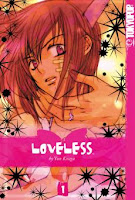 Loveless, Volumes 1-8 by Yun Kouga. This series goes to some really dark places and the characters are twisted and damaged, but I care immensely about them. The loneliness, betrayal, and rejection that they have to deal with is heartbreaking.There is a lot that is left to be explained and a lot that I don’t understand about the world-building, but at this point I don’t care, hoping all will eventually be revealed. It’s a complex story with great art and I want to see where Kouga goes. I really hope that Tokyopop or another publisher is able to bring over the rest of the series (it’s up to at least nine volumes in Japan) because I am completely engrossed in this manga.
Loveless, Volumes 1-8 by Yun Kouga. This series goes to some really dark places and the characters are twisted and damaged, but I care immensely about them. The loneliness, betrayal, and rejection that they have to deal with is heartbreaking.There is a lot that is left to be explained and a lot that I don’t understand about the world-building, but at this point I don’t care, hoping all will eventually be revealed. It’s a complex story with great art and I want to see where Kouga goes. I really hope that Tokyopop or another publisher is able to bring over the rest of the series (it’s up to at least nine volumes in Japan) because I am completely engrossed in this manga.
 Moribito: Guardian of the Spirit, Episodes 13-26 directed by Kenji Kamiyama. What a wonderful adaptation! I loved the original story and wouldn’t hesitate to recommend this series, either. There were a few episodes that felt like filler to me, but for the most part the anime is marvelously done and the animation is beautiful. The second half of the series includes Balsa’s backstory which is just as tragic if not more so than Chagum’s. Chagum really grows throughout the series, from a spoiled child prince into a fine young man. It’s definitely a show that needs to be watched in order to get the full impact and you don’t want to skip any episodes, but it’s great.
Moribito: Guardian of the Spirit, Episodes 13-26 directed by Kenji Kamiyama. What a wonderful adaptation! I loved the original story and wouldn’t hesitate to recommend this series, either. There were a few episodes that felt like filler to me, but for the most part the anime is marvelously done and the animation is beautiful. The second half of the series includes Balsa’s backstory which is just as tragic if not more so than Chagum’s. Chagum really grows throughout the series, from a spoiled child prince into a fine young man. It’s definitely a show that needs to be watched in order to get the full impact and you don’t want to skip any episodes, but it’s great.


